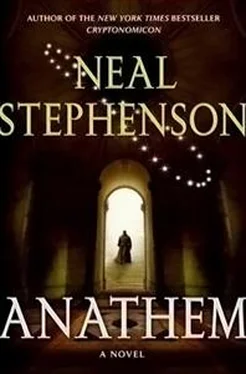Anathem:(1) In Proto-Orth, a poetic or musical invocation of Our Mother Hylaea, which since the time of Adrakhones has been the climax of the daily liturgy (hence the Fluccish word Anthem meaning a song of great emotional resonance, esp. one that inspires listeners to sing along). Note: this sense is archaic, and used only in a ritual context where it is unlikely to be confused with the much more commonly used sense 2. (2) In New Orth, an aut by which an incorrigible fraa or suur is ejected from the math and his or her work sequestered (hence the Fluccish word Anathema meaning intolerable statements or ideas). See Throwback.
— THE DICTIONARY, 4th edition, A.R. 3000
IF YOU ARE ACCUSTOMEDto reading works of speculative fiction and enjoy puzzling things out on your own, skip this Note. Otherwise, know that the scene in which this book is set is not Earth, but a planet called Arbre that is similar to Earth in many ways.
Pronunciation hints: Arbre is pronounced like “Arb” with a little something on the end. Consult a French person for advice. In a pinch, “Arb” will do. Two dots above a vowel are a dieresis, meaning that the vowel in question gets a syllable all its own. So, for example, Deät is pronounced “day ott” rather than “deet.”
Arbran measurement units have been translated into ones used on Earth. This story takes place almost four thousand years after the people of Arbre settled on their common system of units, which now seem ancient and time-worn to them. Accordingly, old Earth units (feet, miles, etc.) are used here instead of the newer ones from the metric system.
Where the Orth-speaking culture of this book has developed vocabulary based on the ancient precedents of Arbre, I have coined words based on the old languages of Earth. Anathem is the first and most conspicuous example. It is a play on the words anthem and anathema, which derive from Latin and Greek words. Orth, the classical language of Arbre, has a completely different vocabulary, and so the words for anthem, anathema, and anathem are altogether different, and yet linked by a similar pattern of associations. Rather than use the Orth word, which would be devoid of meaning and connotations to Earth readers, I have tried to devise an Earth word that serves as its rough equivalent while preserving some flavor of the Orth term. The same thing, mutatis mutandis, has been done in many other places in the book.
Names of some Arbran plant and animal species have been translated into rough Earth equivalents. So these characters may speak of carrots, potatoes, dogs, cats, etc. This doesn’t mean that Arbre has exactly the same species. Naturally, Arbre has its own plants and animals. The names of those species’ rough Earth equivalents have been swapped in here to obviate digressions in which, e.g., the phenotype of the Arbre-equivalent-of-a-carrot must be explained in detail.
A very sparse chronology of Arbre’s history follows. None of this will make very much sense until one has read some pages into the book, but after that it may be useful for reference.
−3400 to −3300: Approximate era of Cnoüs and his daughters Deät and Hylaea.
−2850: Temple of Orithena founded by Adrakhones, the father of geometry.
−2700: Diax drives out the Enthusiasts, founds theorics on axiomatic principles and gives it its name.
−2621: Orithena destroyed by volcanic eruption. Beginning of Peregrin period. Many surviving theors gravitate toward city-state of Ethras.
−2600 to −2300: Golden Age of Ethras.
−2396: Execution of Thelenes
−2415 to −2335: Life span of Protas
−2272: Ethras forcibly absorbed into Bazian Empire
−2204: Foundation of the Ark of Baz
−2037: Ark of Baz becomes state religion of the Empire
−1800: Bazian Empire reaches its peak
−1500s: Various military setbacks lead to dramatic shrinkage of the Bazian Empire. Theors retreat from public life. Saunt Cartas writes Sæculum thereby inaugurating the Old Mathic Age.
−1472: Fall of Baz, burning of its Library. Surviving literate people flock to Bazian monasteries or Cartasian maths.
−1150: Rise of the Mystagogues
−600: The Rebirth. Purging of the Mystagogues, Opening of the Books.
−500: Dispersal of the mathic system, Age of Exploration, discovery of laws of dynamics, creation of modern applied theorics. Beginning of the Praxic Age.
−74: The First Harbinger
−52: The Second Harbinger
−43: Proc founds The Circle
−38: Proc’s work repudiated by Halikaarn
−12: The Third Harbinger
−5: The Terrible Events
0: The Reconstitution. The First Convox. Foundation of the new mathic system. Promulgation of the Book of Discipline and the first edition of the Dictionary.
+121: Avout of the Concent of Saunt Muncoster split into two groups, the Syntactics and the Semantics, founding the Procian and Halikaarnian Orders respectively. Thereafter, orders proliferate.
+190 to +210: Avout of Saunt Baritoe make advances in manipulation of nucleosynthesis using syntactic techniques. Creation of New Matter.
+211 to +213: The First Sack
+214: Post-Sack Convox abolishes most forms of New Matter. Promulgation of the Revised Book of Discipline. Faanian order splits away from Procian. Evenedrician order splits away from Halikaarnian.
+297: Saunt Edhar establishes his own order out of the Evenedricians.
+300: At the Centennial Apert, it is found that several Centenarian maths have gone off the rails (“gone Hundred”) since 200.
+308: Saunt Edhar founds the Concent of the same name.
+320 to +360: Advances in praxis of genetic sequences made at various concents, frequently arising from collaboration between Faanians and Halikaarnians.
+360 to +366: Second Sack.
+367: Post-Sack Convox. Manipulation of genetic sequences abolished. Sharper lines drawn between syntactic and semantic orders. Faanians disbanded. New Revised Book of Discipline promulgated. Syntactic devices removed from the mathic world. The Ita are created; many ex-Faanians join them. The Inquisition is created as a means of enforcing the new rules. Wardens Regulant installed in all concents; modern system of hierarchs instituted in the form that will endure for at least the next three millennia.
+1000: First Millennial Convox
+1107 to +1115: Detection of a dangerous asteroid (the “Big Nugget”) prompts the Sæcular Power to summon an extraordinary Convox.
+2000: Second Millennial Convox
+2700: Growing rivalry between Procian and Halikaarnian Orders gives rise to Sæcular legends of the Rhetors and the Incanters.
+2780: During a Decennial Apert, the Sæcular Power becomes aware of extraordinary kinds of praxis being developed by Rhetors and Incanters.
+2787 to +2856: Third Sack depopulates all concents except for the Three Inviolates.
+2857: Post-Sack Convox reorganizes the concents. Dowments outlawed. Various measures taken to reduce perceived luxury of mathic life. Number of Orders reduced. Remaining Orders redistributed to bring about greater “balance” between Procian and Halikaarnian tendencies. Promulgation of the Second New Revised Book of Discipline.
+3000: Third Millennial Convox
+3689: Our story opens.
Extramuros:(1) In Old Orth, literally “outside the walls.” Often used in reference to the walled city-states of that age. (2) In Middle Orth, the non-mathic world; the turbulent and violent state of affairs that prevailed after the Fall of Baz. (3) In Praxic Orth, geographical regions or social classes not yet enlightened by the resurgent wisdom of the mathic world. (4) In New Orth, similar to sense 2 above, but often used to denote those settlements immediately surrounding the walls of a math, implying comparative prosperity, stability, etc.
Читать дальше





